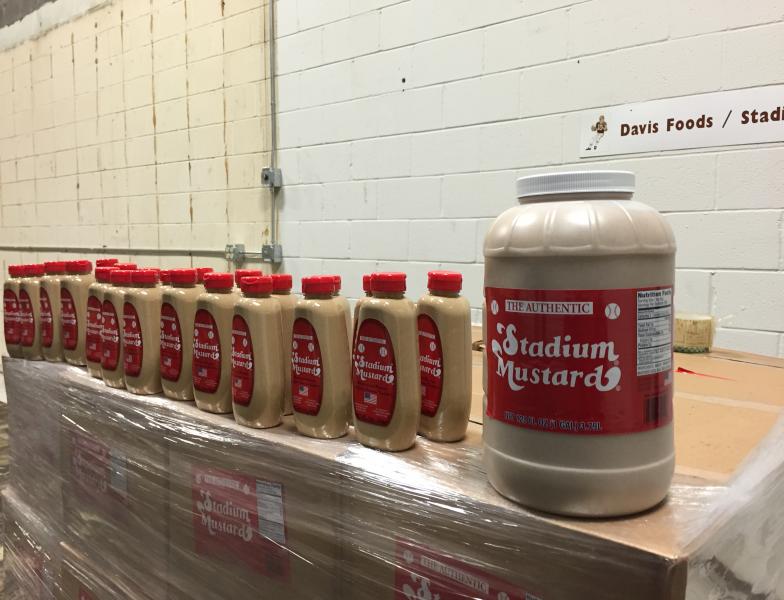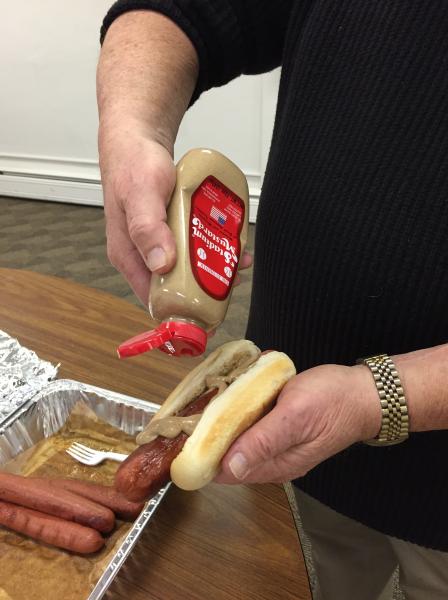Introducing the contenders in the clash of the condiments:
“My name is David Dwoskin, and for the past 46 years I’ve been supplying retail jars of Stadium Mustard throughout Ohio, and now all over the country, and even in the world.” 
And in this corner:
“I am Randy Mintz, the president of Bertman’s Original Ball Park Mustard.”
If there is a mustard war in this town, Mintz welcomes it. “I think that’s always good. It’s healthy. It’s great for exposure for both companies.”
And it’s war he thinks Bertman’s is winning it. “We feel that our product is on top of everybody’s.”
Not if you ask Stadium Mustard’s David Dwoskin.
“I don’t really like to talk about my competition. There’s 3,000 mustards on the market today, and when I started there were only 24.”
The battle ensued decades ago
Like the old baseball joke, you could ask, who’s on first?
 Mintz says Bertman Ballpark Mustard pre-dates Stadium Mustard by many decades. Mintz says Bertman Ballpark Mustard pre-dates Stadium Mustard by many decades.
“We are celebrating, Vivian, 90 years.”
Joe Bertman, the company’s founder, started making mustard around the turn of the 20th century in his Kinsman Avenue garage.
The first to taste it were baseball fans.
“We started with League Park, Municipal Stadium and eventually Jacobs Field when it was built, and ultimately we are parked at Progressive Field.”
Mintz says Bertman’s made the annals of Cleveland sports history.
“When Babe Ruth hit his 500th homerun at League Park, our mustard was there. There’s no documents of him using our mustard, but we know that he ate a lot of hot dogs.”
Original versus Authentic
Bertman’s, like Chef Boyardee, is an immigrant success story that started in Cleveland.
“Joe Bertman came from Europe in 1905, loved the United States, and in 1925 he decided to create a whole line of different sauces, of different coffees, pickles. Then eventually he created his signature product of a mustard.”
Signature? Stadium Mustard’s David Dwoskin won’t sign off on that.
“There’s been a lot of people that have tried to copy our product, and they’re just another one of them.”
But just who’s copying whom?
Dwoskin used to work for Bertman. He was Joe’s most aggressive salesman.
“We both had the same mustard,” says Dwoskin. “He sold it institutionally, and I sold it retail.”
From salesman to competitor
Dwoskin says he went to work for Bertman because he loved the man’s mustard. He still remembers his first taste at Municipal Stadium.
“It was such a beautiful evening there with the white uniforms, my first game, and when I bit into that hot dog, it was an experience I would never forget. Many years later I went back to the stadium, and I tasted the hot dog, and it was that same mustard that I tasted when I was 12. And I found out who made the mustard.”
Dwoskin convinced Bertman to let him take the mustard retail, while Joe stayed with the institutional customers like hospitals, schools and ballparks.
In 1969, Dwoskin registered a new name: Authentic Stadium Mustard.
Then in 1982, after some legal wrangling, Dwoskin obtained exclusive rights to the original Bertman’s mustard, and Bertman had to make a new one.
Lookalike labels
On store shelves, it looks a lot like David Dwoskin’s Stadium Mustard label.
 “My label was made in 1969,” Dwoskin claims, “And their label didn’t come out till 1982. So they sort of copied us.” “My label was made in 1969,” Dwoskin claims, “And their label didn’t come out till 1982. So they sort of copied us.”
Randy Mintz, president of Bertman’s, begs to differ.
“Why are the colors the same? Why does it look so similar? Well, we’re the original,” says Mintz. “Stadium has similar colors. But once you taste our particular product, you’ll know the difference.”
Stadium Mustard’s Dwoskin claims his product’s healthier.
“The difference in our mustards? My mustard has no sugar in it,” says Dwoskin. “Also, I have about half of the salt that he puts into his product to get a similar taste of ours.”
Hot dog vendor’s choice
Your choice of mustard may be a matter of taste, but ask a connoisseur.
“My name is Dave Woods, and I run Davey’s Dog House, which is a hot dog cart in Highland Square.”
He has yellow mustard, too, but for his Akron customers who want brown mustard, "I serve the authentic Stadium Mustard. It’s legendary from Cleveland. It’s a local
 thing. I’m originally from New York, so we got the tradition of the hot dog cart, but from what I hear the mustard belongs to Cleveland.” thing. I’m originally from New York, so we got the tradition of the hot dog cart, but from what I hear the mustard belongs to Cleveland.”
As for the other mustard, "I’m not sure I’ve ever actually tried Bertman’s,” says Woods.
Bertman’s got started a half century before his Authentic Stadium brand, but Dwoskin says his is the one with staying power.
“Our mustard, I’m telling you, you don’t even need to refrigerate it. It will stay for 40 years.”
Both will last
Bertman’s, too, needs no preservatives, and both brands have similar ingredients. They’re both mildly spicy European-style brown mustards.
But Dwoskin says the process sets his product apart.
“It’s the timing, the grinding period, how hot you grind the mustard.”
None of that occurs in Cleveland. Stadium Mustard is made in a private label factory near Chicago.
 Bertman’s used to be made in that same plant, but no more. Bertman’s used to be made in that same plant, but no more.
“Where is the mustard made? Well, there is a proprietary legality that we’re committed to, “says Mintz, “and it’s an Ohio product.”
Though his competitor’s brand is not made in Ohio, he’s not putting it down.
“The Stadium Mustard,” says Mintz, “has a very good product.”
As for the long-ago legal tussle between Joe Bertman and David Dwoskin, Mintz is willing to let bygones be bygones.
“They were partners,” he says. “And sometimes there’s a time and a place that it’s time to move on from each other.”
Bertman’s is at Cleveland’s Ball Park
Ironically, Bertman’s, the mustard with “Ball Park” in its name, isn’t served at baseball games as much as Stadium mustard is.
But Bertman’s is available at Progressive Field.
“We’re in the gift shops, “says Mintz. “We’re in the souvenir stands, and they do a phenomenal job of promoting it for us. We’re a partner of the Cleveland Indians.”
Mintz says his business is growing.
“There’s some strong interest in other ballparks, other stadiums. We're receiving phone calls right now.” 
Bertman’s also supplies Classic Park in Eastlake, home of the Lake County Captains, and Canal Park, home of Akron’s Rubber Ducks.
But David Dwoskin’s Authentic Stadium Mustard spreads farther.
“We’re in stadiums like Ohio State for over 30 years, “ says Dwoskin. “Cavaliers, I’ve been with them for 32 years. We’re in close now to 175 stadiums.”
One still eludes him, and it’s the one he wants most.
“Well, I’m not in Cleveland’s baseball park, but I’ll never give up trying to get back in.”
It appears Cleveland’s mustard war is far from over. |